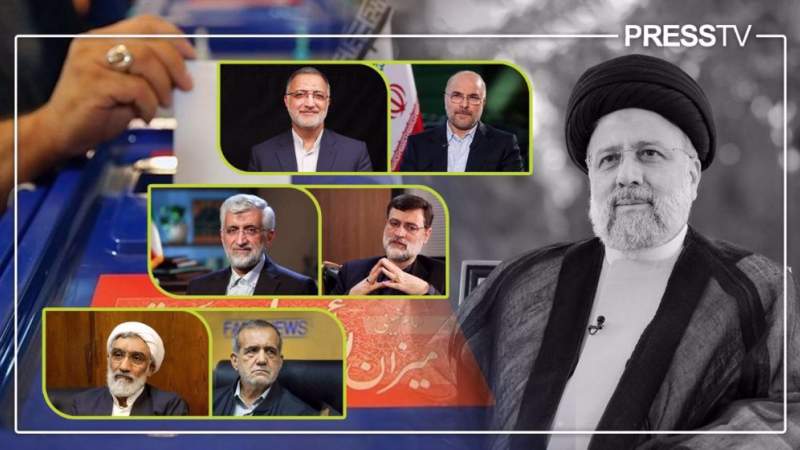Factbox: Iran Set to Hold Presidential Vote on June 28 with 6 Candidates in Fray

News - Middle East: On Saturday, Iran’s 12-member Constitutional Council, the country’s election supervisory body, approved six candidates to contest the upcoming presidential election.
The vetting process began on June 4, following a five-day registration period during which hundreds of hopefuls filed their nomination papers at the Interior Ministry in Tehran.
Only a select number of applications were accepted, as many did not meet the minimum eligibility criteria set by the country’s election authorities.
The Constitutionally-mandated vetting body took six days to study the credentials of the candidates, including many high-profile names, and finalized the list on Saturday.
This list was then submitted to the Interior Ministry, which announced the names to the media.
Candidates in the fray
The six candidates approved to run for the presidency are:
1. Mohammad Bagher Ghalibaf: The current parliament speaker who has previously contested presidential elections. In 2021, he backed President Raeisi instead of running.
2. Saeed Jalili: The former lead nuclear negotiator and head of the country’s top security body. He withdrew from the 2021 race in favor of Raeisi.
3. Masoud Pezeshkian: A veteran lawmaker representing Tabriz in the Iranian parliament and former deputy speaker (2016-2020).
4. Mostafa Pour Mohammadi: A veteran politician and judiciary official, previously served as interior minister (2005-2008) and justice minister (2013-2017).
5. Alireza Zakani: A former senior lawmaker and current Mayor of Tehran. He withdrew from the 2021 presidential race in favor of Raeisi.
6. Amirhossein Qazizadeh Hashemi: The former lawmaker and deputy parliament speaker, currently serving as head of the Foundation of Martyrs and Veteran Affairs.
Elections and Iran’s Constitution
The snap presidential election follows the death of President Ebrahim Raeisi and his companions in a helicopter crash in northwestern Iran on May 19.
According to Article 131 of the Islamic Republic’s Constitution, in the event that a president dies, resigns, becomes incapacitated, or is dismissed for more than two months without replacement, the first vice president assumes the mantle of leadership.
Mohammad Mokhber, who served as the first deputy president under Raeisi, has been serving as the acting president since May 19 with the approval of the Leader of the Islamic Revolution.
Raeisi was not the first Iranian president to die in office.
In 1981, the Mujahedin-e-Khalq (MKO) assassinated then-President Mohammad-Ali Rajai. A new election was called, and Ayatollah Khamenei, who is currently the Leader of the Islamic Revolution, was elected to succeed Rajai after a landslide victory.
Who was President Ebrahim Raeisi?
Born in December 1960 in Mashhad, northeast of Iran, President Raeisi began his religious studies first in his hometown and later in the Qom seminary at age 15.
With background in law, in his early 20s, he served as a prosecutor in various Iranian cities and was appointed Tehran's deputy prosecutor in 1985.
He was promoted to Tehran's prosecutor in 1989 and remained in that position until 1994.
From 1994 to 2004, Raeisi headed the General Inspection Organization of Iran, an anti-corruption body.
He served as the first deputy of the country’s judiciary from 2004 to 2014 and as Iran’s Attorney General from 2014 to 2015.
On March 7, 2016, Ayatollah Khamenei appointed him as the chairman of Astan Quds Razavi, the country’s largest religious endowment in Mashhad.
Raeisi ran for president in 2017, finishing second to Hassan Rouhani.
In March 2019, he was appointed head of the judiciary by Ayatollah Khamenei, where he implemented significant judicial reforms, addressed economic corruption, and enhanced judicial efficiency.
Elected president in 2021 by a landslide, Raeisi expanded and solidified Iran's ties with neighboring countries, focusing on mutual security and countering the impact of US sanctions.The next presidential election was originally scheduled for 2025.
#Iran About 3 months-
08:44
Armed Forces: We continue to fulfill our jihadist duty in support of the oppressed Palestinian people, in defense of Yemen.
08:44
Armed Forces: We continue to fulfill our jihadist duty in support of the oppressed Palestinian people, in defense of Yemen.
08:44
Armed Forces: The drone that was shot down is the 8th of its kind during the Battle of Promised Conquest, Sacred Jihad in support of Gaza.
08:44
Armed Forces: An American (MQ-9) drone was shot down while carrying out hostile activities in the airspace of Marib province.
08:34
Media sources: Protesters are blocking the 'Ayalon' highway, which connects the cities of 'Greater Tel Aviv,' and are setting fire in front of the Israeli Ministry of Defense.





